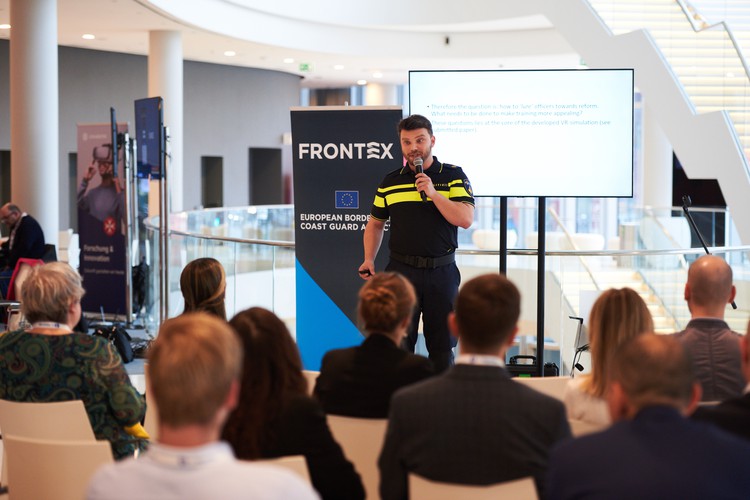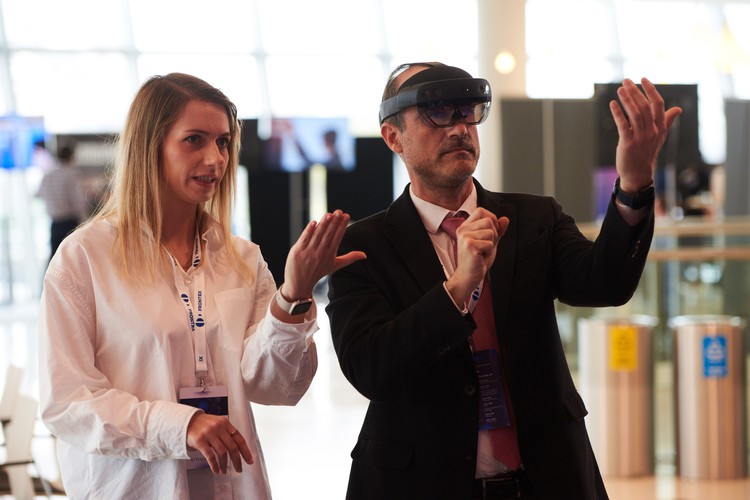Frontex has brought together the European and national training experts,
EU agencies and industry to start shaping the future of training technologies
in a rich and interactive debate. A conference taking place on 28-29 February
in Kraków, Poland, constitutes a big leap towards a more innovative training
methodologies for the borders.
News
The future of training for border guards
2024-02-29
The vision
Frontex has organised a conference on innovative industry solutions to support the training of law enforcement officers today by assessing and evaluating the potential needs of tomorrow. The Kraków Congress Centre attracted over 200 participants, including EU agencies, researchers and representatives from industry, all keen on developing new technologies that will help avoid the future risks and threats at the EU’s external borders.
Hans Leijtens, the
Executive Director of Frontex, welcomed the participants and outlined the
objectives of the conference: “We are organising this conference because we
need to understand how we can use new technologies to better train our border
guards, and especially because Frontex will employ 10,000 new border guards by
2027. We also see beyond our Agency. This event is a unique opportunity
for Member States to learn about the modern training technologies and see how
they can use them for their own training at national level”.

The subject matter
The main goal of the conference was to demonstrate innovative industry solutions that can support the training of law enforcement officers. During the two-day event, researchers presented advanced training concepts and technologies that can be practically applied to supporting training activities in the European Border and Coast Guard context. The exhibition area hosted around 50 industry representatives demonstrating the latest achievements, such as virtual and augmented reality sets, video training content production, wearable devices, and AI solutions for more real-life training situations.
The participants could follow six panels covering various aspects of future training technologies:
- Technology-driven opportunities for training innovations;
- The trainer’s challenges and needs for the future – to focus on the future role of the trainers;
- Focus on the main actors of the training process in leveraging technologies – to put the spotlight on the needs of a learner;
- The neuroplasticity of learners’ brain – to deal with memorisation techniques and absorption of knowledge;
- Gaming in learning.
The
presentations and lively Q&A sessions in the panels and in the exhibition
area served as an excellent knowledge-sharing and networking experience
involving all actors responsible for making technological choices related to
the training of the European Border and Coast Guard community.

A peak into the future
Many researchers, entrepreneurs and academics from the major European institutions, border police and the European Commission agreed that the future will be guided and dominated by the increasing capabilities of the virtual and augmented reality. The AI potential in creating realistic training conditions should be observed and developed with the awareness of its own risks and impact on human mind. Given the fact that the borders and their management are essential elements of migration management, well trained border guards are key to respond to this challenge.
“We are involving all interested parties in this conference, as we all have a share in shaping the future. Member States can use the ideas from today’s debates and presentations to train their national crews. Also, we will keep them informed about the Frontex study on these emerging technologies for border management training, which is now being conducted in order to establish the Border and Coast Guard Academy,” announced Frontex Executive Director Hans Leijtens.
Conference
website: Conference on
Future Training Technologies || Frontex